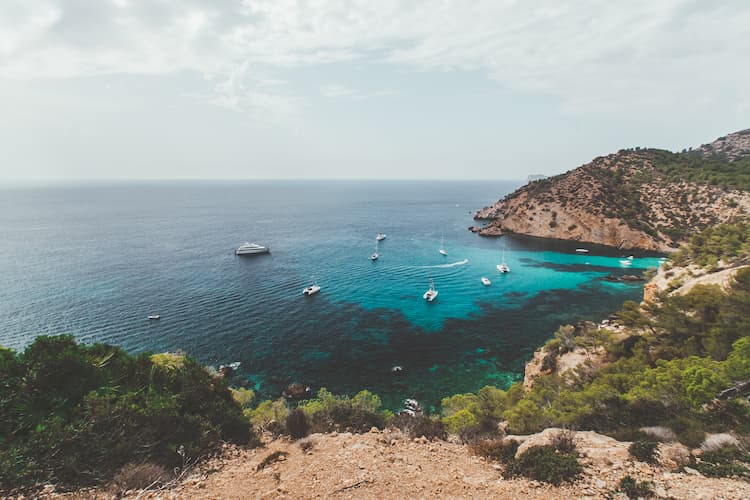
We are reader-supported and may earn a commission on purchases made through links in this article.
The world is in chaos and that turmoil is spreading. Risks, uncertainty of geo-political situations, and disrupted itineraries have shaken the travel industry, which had been re-emerging with high demand after the disastrous pandemic. Many travelers, including myself, trudged on, craving that next exciting globe-trotting experience and booked trips in spite of all the havoc.
However, cancellations at every level of tourism have become reality and now haunt the traveling public. Iconic treasures in Israel are being missed due to the Israeli/Hamas War; Baltic Sea adventures, the glorious city of St. Petersburg, Russia and the beautiful, Black Sea ports of Ukraine have been erased from trip itineraries.
Royal Caribbean beach stays on Labadee Island in gang-governed Haiti have been halted and France, Italy and other E.U. nations have recently raised security risks to the highest level in tourist meccas like Paris, London, and Rome due to the terrorist activity in Moscow.
The most outrageous disruption to travel has been the Iran-backed, Yemen Houthis Rebels who have become the rag-tag rulers of the Red Sea. Their 100+ drone and missile attacks on vessels of 35 countries, have disrupted global shipping and supply routes and have cost the Cruise Industry billions of dollars to reroute their ships or cancel itineraries through the Red Sea and Suez Canal altogether.
None of the world powers have acted offensively to put an end to these random violent strikes. The US spends three million dollars for every missile they fire to intercept a weapon projected by the Houthis, instead of brokering a resolution to deal with this menace to the world economy.
Best Tips & Tools to Plan Your Trip
On March 7, 2024, the Houthis killed three crew members on an attacked vessel, and a targeted container ship carrying grain and toxic fertilizer finally sank two weeks after the initial hit. The red line was crossed.
Concerned for the safety of passengers and crew of the Azamara Journey, the company was forced to cancel its 27 day, fully-booked, half-world cruise from Singapore to Athens because the itinerary sailed into the Straits of Aden, up the Red Sea and through the Suez Canal.
My husband and I were among the passengers of the Spice Route Voyage, eager to explore the intriguing ports of call, including Hambantota, Sri Lanka, Cochin, India, Jeddah, Saudi Arabia, and Sharma El Sheikh and Sokhna, Egypt.
When we received notice of the cruise cancellation in its entirety, I felt as though my enthusiasm had been shattered like the impact of hitting a brick wall at a hefty speed.
Azamara had held steadfast to their determination to sail until five weeks before embarkation, knowing that a cancellation would cause serious financial drain on the company and a tremendous blow to all the preparations made by booked passengers.
But in the end, we faced the painful process of transferring excited energies for exploration to the exhausting and frustrating procedures of applying for reimbursements and determining cancellation fees.
The Spice Route Voyage is one of Azamara’s longest and most expensive cruise itineraries, so the financial investment had been significant; for us just under $15,000. In addition, we paid $2625 on Singapore Air, to get from LA to Singapore. Return home on Turkish Air from Athens resulted in flight charges of $1820-all non-refundable airfares!

To their credit, Azamara set up a Redeployment Department for the explicit purpose of servicing passengers reeling from this cancellation. Although the company preferred that passengers accept future cruise credits or transfer payments to other cruises, they did allow passengers to request a full refund.
They offered clients who independently booked airfare $1000 per passenger to cover cancellation or change fees. Of course, all of this required wait times on phone calls, filling out request for reimbursement forms on-line, uploading documents, determining cancellation fee policy of airlines and waiting up to 30 days for refunds from Azamara.
My patience waned thin, piled atop mounds of disappointment.
Shocked that Singapore Air’s cancellation fee alone, amounted to $2614, I realized that Azamara’s $2000 offer for airfare reimbursement would not cover the losses. It became clear that with the world in turmoil, future travel planning must include new levels of scrutiny.
The number of destinations around the globe plagued by civil unrest, catastrophic weather events or violent border disputes keeps rising. Evolving chaotic situations usually impact travel decisions.
Lessons Learned and Tips to Safeguard Travel Investments

1. Before any travel company is consulted, any hotel is contacted or any flight booked, the traveler should research the selected destination to evaluate the risks associated with that area and decide if he/she is willing to accept those potential jeopardies. International geo-political situations, weather extremes, or probability of violence should not come as a surprise. So do your homework.
2. Bookings for international destinations should be delayed as long as possible prior to departure. Days of reserving and paying for any type of travel arrangement a year in advance are over for us. If the destination is so popular that waiting means missing out, cancellation policies for airlines, hotels or travel companies need to be determined first.
Knowing what will happen to your money if something unforeseen develops either before or during the trip will go a long way to making the right financial travel decisions.

3. Travel Insurance is a must these days, but don’t be fooled into complacency about coverage, which is always based on the dollar figure for services provided. If you purchase travel insurance covering a trip once you arrive at the destination, don’t assume that this will also cover non-refundable airfare.
It won’t. We had travel insurance for the Azamara Cruise itself, but we arranged our own plane tickets. Azamara would have covered the cancelled flights, if they had booked our airfare. Of course, the overall price of the insurance would have jumped if it included air, but had we opted for the initial increase, at this point we wouldn’t have lost any money.
4. Consider securing refundable airfare, even though the cost will be higher. Every traveler’s situation is unique, so perhaps a comparison of the price of buying refundable tickets verses insuring the non-refundable ones will help the individual make the right choice.
So, what’s the bottom line: Are we done traveling? No. In fact, we are awaiting all the refunds due us from this unfortunate cancellation so we can apply it to a trip to Tunisia, scheduled just a few months away, with a hop-over to Cairo for a dusting off from the desert.
Are there risks? Sure – in both places actually. But we have scrutinized the cancellation policy and possible cancellation fees of each leg, sought out the most reputable agencies to provide services we will use along the way, and we will insure both air and land costs. We have replaced our down and out disappointment with excitement for our next adventure. That’s what travelers do.
Inspire your next adventure with our articles below:
Author Bio: After 33 years of providing professional treatment services to patients in a PA State Psychiatric Facility, Carol and her husband retired to Chapala, Mexico in 2006. During their interim as expatriates, they have expanded their travel destinations to over 120 countries. Carol has volunteered to teach English to both Mexican adults and children, acted as Director of the ESL program for many years, and continues teaching for over 17 years. She has written for all the local, English/Spanish magazines while residing in Mexico and has won several literary awards from these publications. In addition, Carol has written travel stories and destination pieces for international travel publications, both print and on-line, including, Escape Magazine, International Travel, International Living and Go World Travel. Her work can also be found in three published anthologies, ‘Tales from the Couch,’ ‘Insider’s Guide to the Best Mexican Holidays,’ and most recently, ‘Bravados, Life, Love and Aging in Chapala, Mexico,” all available on Amazon.com.
- Fiddle, Flutes & Pubs: A Musical Journey Through Northern Ireland & County Donegal - July 14, 2025
- Tokyo vs. Osaka: The Ultimate Face-Off for First-Time Visitors to Japan - July 14, 2025
- When Is the Best Time to Visit Iceland? Find Your Perfect Month for Budget, Weather, and Activities - July 14, 2025

